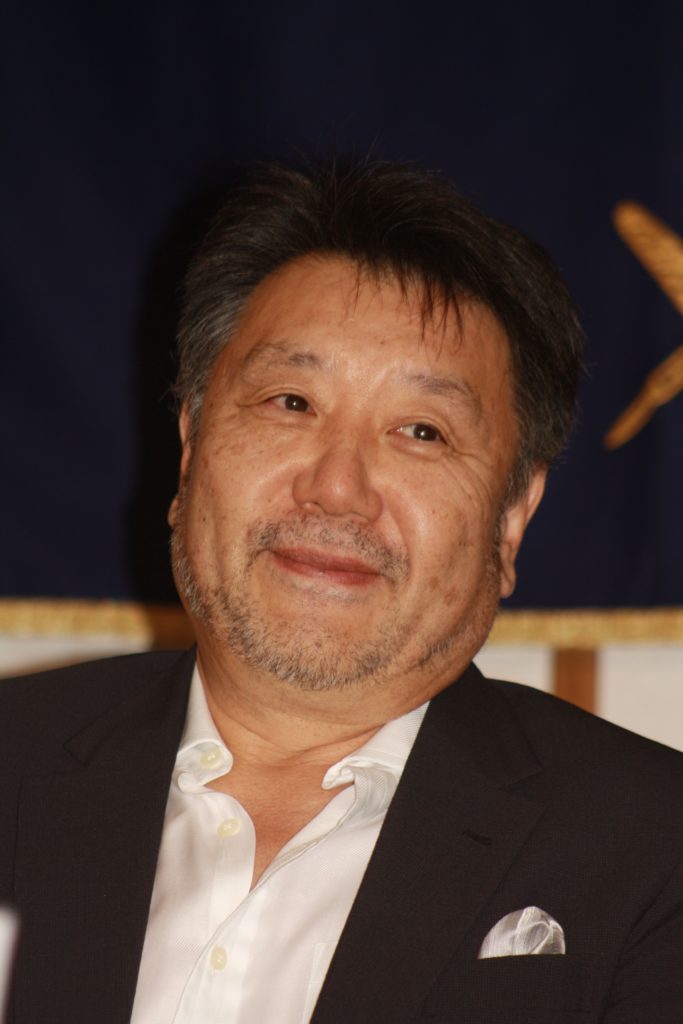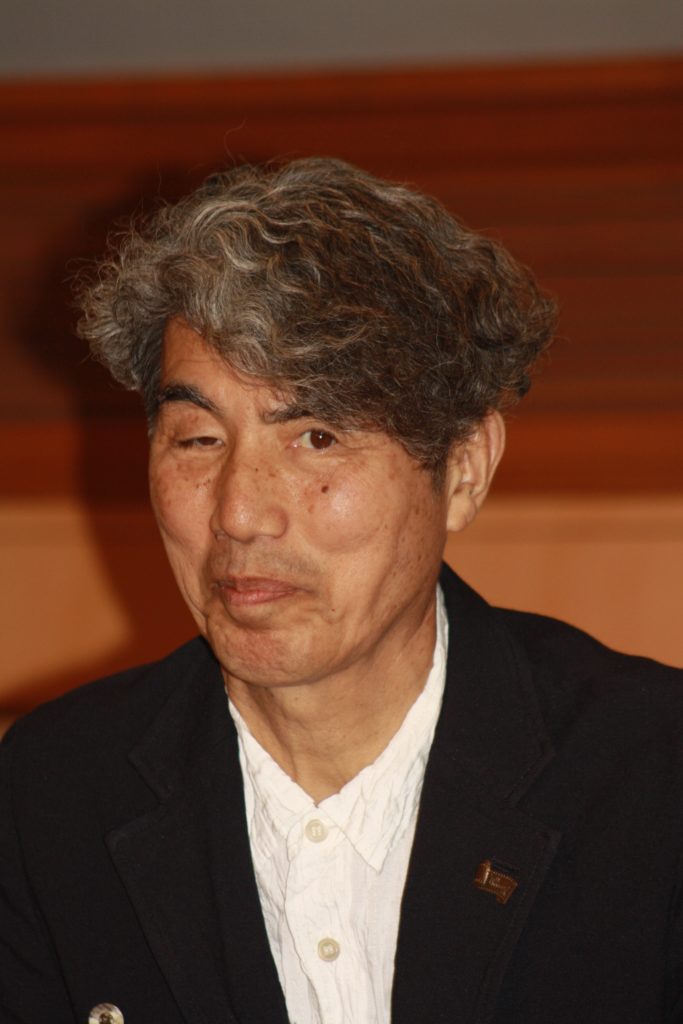Masato Harada kicks off Tokyo`s 28th Film Festival with five films
Film Review & Interview with Japanese Film Director Masato Harada
by Gabriella White
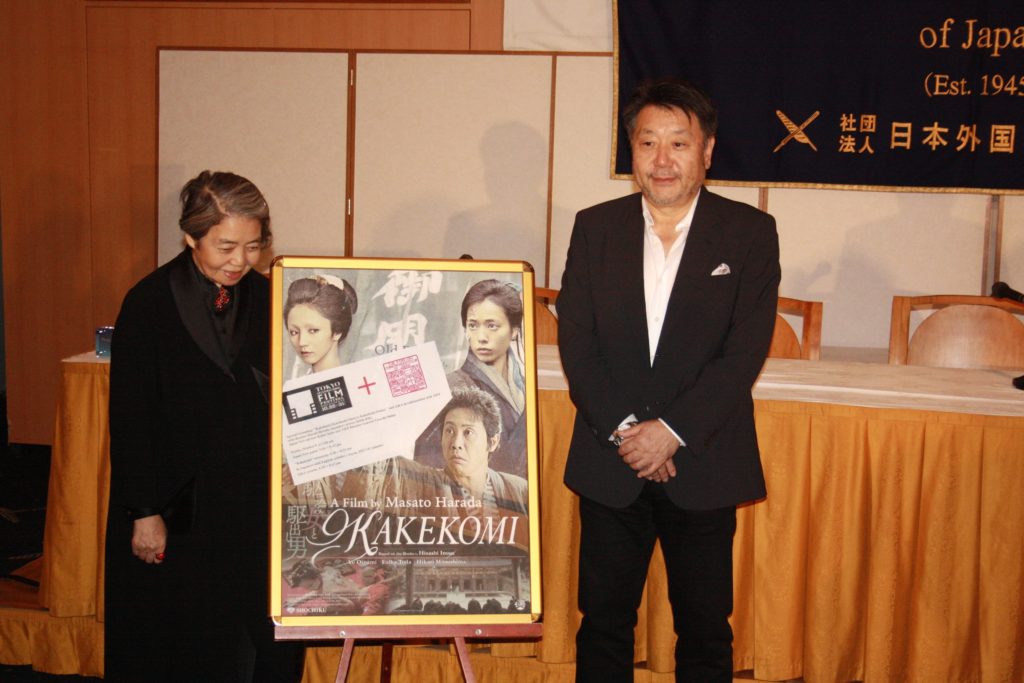
Kiki and Harada launching Kakekomi on Fri. 9th Oct. 2015 at the Foreign Correspondents Club of Japan and Press Conference for TIFF
Film Title: KAKEKOMI
Synopsis
WRITER-director Masato Harada`s first ever jidaigeki period film Kakekomi is based on a story by Hisashi Inoue, a classic Japanese author who also provided the source of inspiration for Harada`s award-winning “Chronicle of my Mother”. Popular actor Yo Oizumi plays the main character, Shinjiro, a trainee doctor whose ambition it is to write; Erika Toda plays Jogo, an iron-maker on the run from her abusive husband. Hikari Mitsushima is cast as O-Gin, the mistress of a wealthy merchant who may be a murder. The legendary actress Kirin Kiki joins the cast in this warm-hearted, hilarious and deeply moving story about love and divorce in 18th Century Edo-era Japan.
Interview with the Director
Writer-actor-director MASATO HARADA is highly acclaimed for a range of award-winning films, as well as his roles as villains in Hollywood blockbusters. Harada is, in the west, most well-known for his memorable acting role as Omura in “The Last Samurai” starring across from Hollywood legend Tom Cruise. His role as Mr Mita in “Fearless” also won him many fans. His most well-known works include “Kamikaze Taxi” (1995), “Bounce Ko Gals” (1997), “Jubaku – Spellbound” (1998), “Climber’s High” (2008) and “Chronicle of My Mother” (2012), the latter of which stars Kakekomi`s cast member Kirin Kiki. His early-summer release Kakekomi and his late-summer The Emperor in August have both been box-office hits, as well as being heralded at international festivals. Cannes is a nut he has yet to crack. Tokyo-born Actress KIRIN KIKI made a name for herself in many uniquely comedic and eccentric roles on TV, but she slipped into legend when she began anchoring films by Japan’s masters. Her role in Hirokazu Koreeda’s 2008 Still Walking won her a Best Supporting Actress award at Japan’s Oscars, and she also received a Best Actress award for Joji Matsuoka’s 2008 Tokyo Tower – Mom and Me, and Sometimes Dad. For Kiki’s first collaboration with Masato Harada, Chronicle of My Mother, she received the Japan Academy Award for Best Actress.
I ask Harada, “Which do you prefer, acting or directing?” Harada bursts out laughing. “Of course, directing. Because I don’t have to memorize the lines. I remember I was panicking in The Last Samurai when the director changed my dialogue the day before shooting and I had been doing that to my actors. I realized that I should really stop doing that, but it only lasted a year.”
As for Harada`s next project with Ms. Kiki, he replied “I do have something in my mind but I just can’t officially announce it yet. I’m thinking about a story which features a historical figure that nobody would expect Ms. Kiki to play.” Actress Kiki apologetically, yet feistily, butts into the interview as she tells Harada how no-one is perfect and that his directing skills still leave a lot to be desired if he is to become a world master. “I keep telling him to think outside of the box and push his limits. Yes, he is great but we now need to rise above excellence. When he finally takes my advice on tips I have offered, that`s when you will see this man soar to interesting and unusual levels you would never have even dreamed possible. And it is in him. I can see it each time I work with him” she explains.
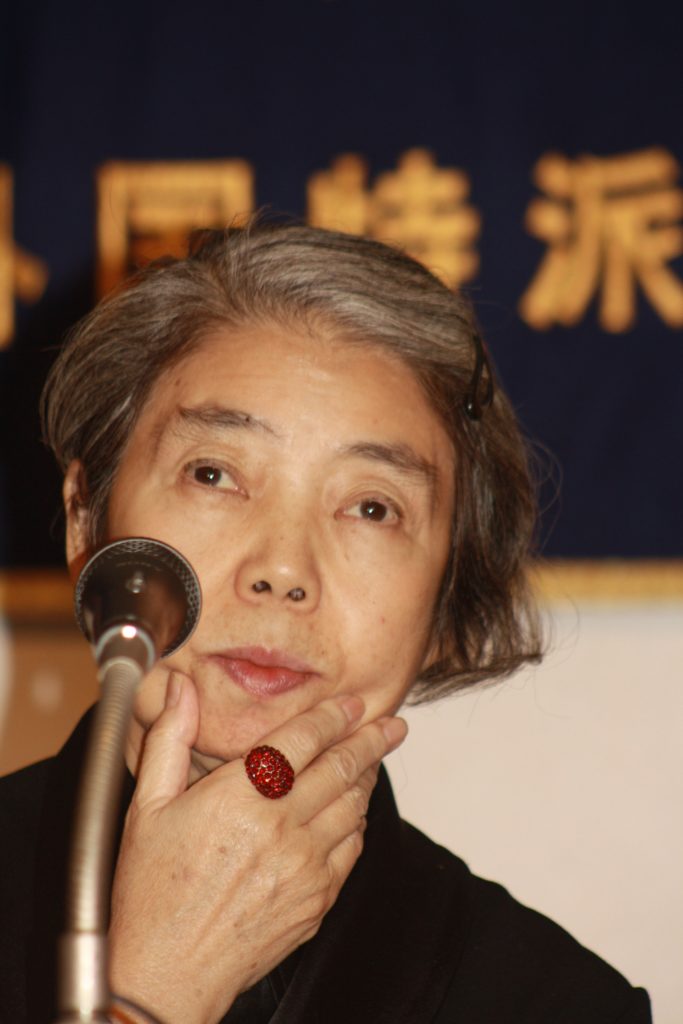
Kirin Kiki, an award-winning actress in Japan and national treasure
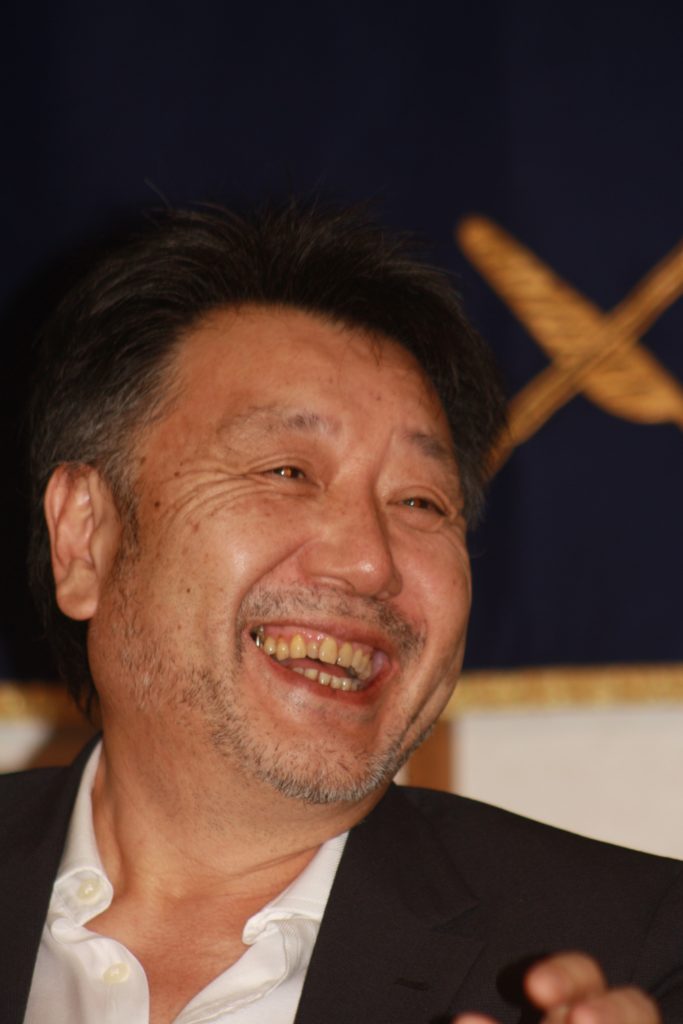
Harada has directed a grande total of 23 films. Kakekomi is his 22nd release. The 23rd will be premiered next week at the official launch of Tokyo International Film Festival amongst others.
Harada laughs, “It is fair to say that Kiki and I had a fair few arguments about casting. Kiki was never happy with it.” He continues “…I am grateful for having Kiki on board as she brings some interesting directive substance to the table and that comes across in the film.” Upon asking Harada whether his message to an international audience differs to that of Japan, he seizes the opportunity to highlight the political parallel between Japan`s Edo era and Shinzo Abe, the country`s prime minister today. He goes no further and ends the unexpected answer with a safe, yet emphasized “maybe”. As for the message to the western audience, it is an ever-vague one. He tells me “I hadn`t really thought about it. The film is open to interpretation. However, I deliberately chose names that rolled off the tongue for English-speakers; names such as “Jogo”, for example.” “Easy to say, right?” he smiles.
Film Review
A stunning performance by lead character Shinjiro, played by Yo Oizumi one of Japan`s prized comedy actors, the character of Shinjiro keeps the film light and funny with his harmless as gentlemanly slip-ups and anecdotes; his sexy wit steals the show in his bluffs of babbling intelligence when faced with the notorious “kakekomi”.
Worth a watch, this internationally controversial comedic period drama with a somber sword-like edge to it, highlights Japan`s ever inward-looking, fearful culture, the inequality of women, geishas galore, sex, drugs, violence and humiliation of wives as factory slaves, beaten to the ground with the iron bars they themselves have worked so hard to cast, whilst being forced to watch their husbands indulge in sexual pursuits with their string of shameless prostitutes.
Demanding divorce, the women would get chemicals thrown in their eyes and factory wounds for even daring to ask the question. These opening scenes are undoubtedly disturbing and the first half hour of this film was I have to say not my cup of nihon-cha. However, the rawness of this two-and-half-our drama softens somewhat later, perhaps metaphorically when we consider the anticipated changing times of Japan itself. Divorce by a woman`s request was in the Edo era not a possibility and so women seeking divorce or fleeing abusive husbands would run to the Tokei-ji Temple in Kamakura, two hours outside of Tokyo. The sense of humor and resilience of the women of this time becomes a rising dawn of hope towards the touching finale of this applaudable, historical epic by Director Harada from the land of the rising sun.
Harada’s other films, Chronicle of My Mother, Kamikaze Taxi, Climber’s High and The Emperor in August will also be screening during the festival, which runs from 22nd October to 31st October 2015.
© Gabriella White
The Culture Cave 2015 ©
Trailers
Watch the international trailer for Kokekomi here
View original Japanese trailer here
Gallery: All Images are property of The Culture Cave 2015 ©




